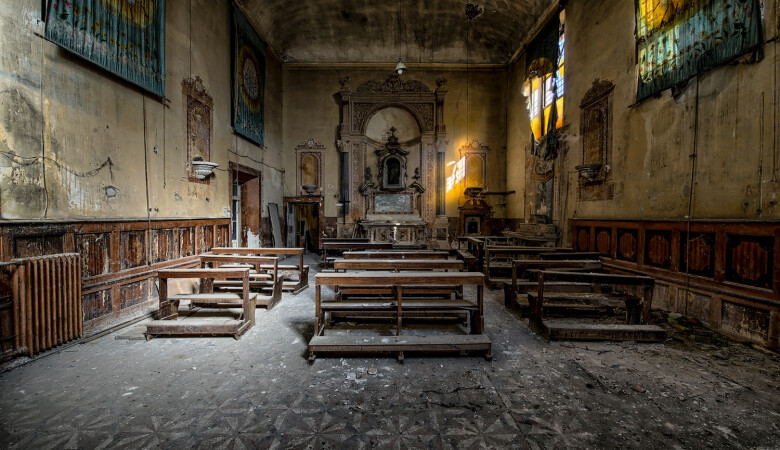Series: 1 Corinthians
Eternal Submission to God's Heavenly Throne (1 Corinthians Sermon 61)
December 06, 2020 | Andy Davis
1 Corinthians 15:28
Deity of Christ, The Kingdom of Christ
Pastor Andy Davis preaches a verse-by-verse expository sermon on 1 Corinthians 15:28. The main subject of the sermon is that all things will be subjected to God as a result of Christ's work.
- SERMON TRANSCRIPT -
So take your Bibles and turn to the text you just heard read, 1 Corinthians 15. Now this morning, effectively we're gonna zero in on just one verse, verse 28. We human beings, if we're honest with ourselves, have a serious problem when it comes to authority and submission, a serious problem. On one hand, we've seen ample evidence of the old adage that, "Power tends to corrupt and absolute power corrupts absolutely." We've seen evidence of that. Jesus in the first century teachings, he made it plain that the rulers of the Gentiles lorded over the people that they were ruling and the high officials exercised authority in a domineering sort of way, but Christian leaders were not supposed to be like that. Centuries before Christ, said those words the prophet Daniel, likened world empires to ravenous beasts that came up out of a turbulent sea to crush and kill and destroy, four beasts one after the other, Daniel 7. Kings and dictators and premiers and masters and bosses have arisen in every generation to use their power to feed their flesh and stoke their ego, and crush and destroy those that they were ruling over. We've seen it. The 20th century gave a sample evidence as one terrible dictator after another rose and abused power, whether Mussolini or Hitler or Stalin, Pol Pot in Cambodia, Mao Zedong in China. Just one tyrant dictator after another, doing that very same thing that Jesus warned about.
So with good reason, we feel we are mistrustful of those with power and authority. But on the other hand, if we're honest with ourselves, we see inside ourselves a tendency to resist authority that comes over us. We like our freedom. We like to rule our own thing. We like autonomy. We resent people telling us what to do. I was talking to Kevin Shaub, he's from Texas, and he gave me permission to say his comment, he said, "People from Texas don't like anyone telling them what to do." I have a feeling I can speak for people from Massachusetts; they don't like it any better. Maybe even people from North Carolina don't like anyone telling them what to do.
Throughout my life, as the Holy Spirit has more and more illuminated my mind to my sin nature, I've seen a regular pattern of resistance and pushback to God-ordained authorities in my life, whether my parents, bosses, teachers, professors, state police officers, other people. I remember recently I was on a tour, a historical tour, in a city in Europe, and the tour guide, we'd reached a certain place and I went up on some stairs to listen a little bit better, and he looked at me and rather imperiously told me to get down from the stairs. I tell you the feelings that went through my mind at that moment. I was like, "Really?" But I got down, behaved properly, but there was something inside me that just pushed back at being told what to do. And all of you who are parents know exactly what I mean when I tell you that the infants come into the world, and as they do and as they grow, they very much demand to rule their own world and they would like to rule yours too. And so parenting, that's a struggle that we have.
We sinners neither wield authority well, nor yield to authority well, either way. And I believe that a lot of the hottest cultural controversies and issues that face us every day that are actually somewhat rending evangelical unity, you will find, if you look for it, authority and submission problems on all sides. Misuse of power, rebelliousness against power, you're gonna find it, it's there. And we might think that the heaven that we're going to will be free at last from all authority and submission, but it won't. Actually what's going to happen is, and we're gonna study that in the text today, we are going to a universe, a new heaven and new Earth, where authority itself will be central and perfect, and the hearts of all of the redeemed will be healed from all patterns of rebellion and will both wield and yield to authority as God wills perfectly. We're not going to an egalitarian heaven where there is no authority and submission, but rather where all of these things will be healed, where Christ's subjection to his Father will be a pattern for all creation to be in harmony around the throne of God, so that God will be all in all.
So there it is. That's the sermon. The rest is details and we're gonna go through it, but it's a beautiful vision that this text gives us of the future. Now, let's get some context. It's been a while since we've been in 1 Corinthians 15, so we need to go back and look at what this chapter is about and what verse 28, that we're zeroing in on today, how it sits in the chapter. So in the context, Paul is right into the Corinthian church that he helped plant. It's a dysfunctional, messed-up church. They have a lot of problems, and one of the problems that they had was, according to verse 12, it seemed that some were there who taught that there is no resurrection from the dead, that resurrection from the dead, bodily resurrection, cannot happen, does not happen. In some sense, perhaps they were saying it ought not happen. Best to be liberated from our physical bodies. And so in verse 12, Paul says, "how can some of you say there is no resurrection from the dead?" So in order to heal this false understanding, he goes back to the basics of the gospel at the beginning of the chapter, verse 3-4, "Christ died for our sins according to the Scriptures. He was buried, and he was raised on the third day according to the Scriptures." That's foundational. That is the gospel of our salvation. In verse 14, he says, "If Christ has not been raised, our preaching is useless, and so is your faith." So it's essential to Christianity. The bodily resurrection of Jesus Christ from the dead is essential to the Christian faith. But Paul's point here is not so much that Christ has been raised and all that. He's going beyond that to the bodily resurrection of all Christians at the end of all things. That's really what the chapter is about. Verse 20, "Christ has indeed been raised from the dead, the firstfruits of those who have fallen asleep." So there's a vast harvest of Christians who will themselves, like Christ, be raised bodily from the dead. That's what this chapter is about.
Now, Paul needs to answer, if Christ has won this great resurrection victory over the grave, then why does death still seem to have its way? Nothing's changed. People are still dying; we're still going to Christian funerals. People we love in the church are dying. Loved ones, mothers and fathers, brothers and sisters, even children are dying. So how do we understand this? This intervening period in which the fullness of Christ's mighty resurrection victory is being applied gradually by the Father, little by little. The Father, according to the text, is subduing all of his enemies through Christ, little by little. Look at verse 25-26. "He must reign," Jesus must reign, "until he has put all his enemies under his feet. The last enemy to be destroyed is death." So since death is the final enemy or the last enemy, it will continue to steal, kill and destroy until the end of time. Don't be surprised at that. It's gonna continue. It's gonna continue to wreak havoc on planet Earth until God finally decides to end all of human history. Meanwhile, the gradual, spiritual hidden advance of the kingdom of God, the kingdom of Christ, will continue. Every tribe and language and people and nation has individuals chosen in Christ before the foundation of the world to be holy and blameless in God's sight. They are the unconverted elect. We don't know who they are until the gospel comes and they respond to the gospel. That's what missions is all about, that's why we raise money for missions for the IMB every December through the Lottie Moon Christmas Offering, because there are unconverted elect. Paul says, "I endure everything for the sake of the elect, that they too may obtain the salvation that is in Christ." And so that's what's going on. This is evangelism and missions. This is the hidden spread of the kingdom of God. He must reign until he puts all his enemies under his feet. And after that has happened, then the end will come; the kingdom will be consummated in eternity. And that will include, based on this verse that we're looking at today, the perfect harmony of all of creation under the throne of God, around the throne of God. That's where we're going. That's the spread of the gospel and of the kingdom. And it will be a world perfectly content and submissive under the throne of Almighty God. No longer rebelling to the throne, no longer murmuring or questioning or plotting or any of those things. But all of those things will be ended. It will be a world perfectly in subjection to God's reign, in submission to his authority. So look at verse 28, "When all things are subjected to him, then the Son himself will be made subject to him who put everything under him, so that God may be all in all."
I. The Rebellion Finally Subdued
All right, so the first point in the outline is the rebellion will be finally subdued, the rebellion finally subdued. In order to understand that rebellion, we have to go back to the first creation, the beginning of creation, Genesis 1. God created all things in heaven and Earth. Because he is the Creator, he is the King, he rules over all things, sovereign over what he has made. And as King, he is the Lawgiver; he has the right to give the laws by which his kingdom will be ruled. And in giving laws, he must also be the judge to determine whether his laws were obeyed or not. Creator, King, Lawgiver and Judge, these are the four roles of God that are foundational. But we are taught from the Bible that I think before man was created, Satan and it seems a third of the holy angels fell into rebellion against the throne of God, if Isaiah 14 is talking about Satan's ambition. He decided to rise up and topple the throne of God and become king himself. And God threw him down along with the angels; they became what we call demons or evil spirits. Then Adam, at the Tree of the Knowledge of Good and Evil, joined Satan in his rebellion against God the King, against God's authority. He disobeyed God. And through that one man's disobedience, his entire progeny, his sons and daughters to this present day and to the end of time, became sinners. And so sin is... We're told in 1 John 3:4, sin is lawlessness, a fundamental rebellion against God's laws. Sin is a force, a pervasive force, inside our hearts of rebellion against God's throne, against God's laws, independence from God. A lot of non-Christians, they're just independent, they don't think about God in all their thoughts, they don't consider him, they don't think about God's rules, they don't think about God. Others are aware of God's laws and just disobey them, disregard them, throw them off. And even amongst God's people in the Old Testament, the Jews, and then now for us as believers in Christ, we realize that principle of resistance, of rebellion against God's authority, is still there. And so the terms "stiff-necked" and "hard-hearted" are very similar. Basically, they're just two different ways of saying the same thing: hard resistance to what God wants you to do. You hear God talking to you and you say, "No." So that's what stiff-neck... You're not yielding to God's kingly authority. Hard-hearted; you won't submit to him. So that's the problem: the rebellion. All evil flows from this.
"Sin is a force, a pervasive force, inside our hearts of rebellion against God's throne, against God's laws, independence from God. "
Now, the gospel of Christ is the remedy and the only remedy to this universal problem. And so the gradual subduing of God's enemies by his victorious Son is one way to look at it. Look again at verse 24-25, "Then the end will come when he hands over the kingdom to God the Father, after he has destroyed all dominion, authority and power, for he must reign until he has put all his enemies under his feet." So all of God's enemies will be subdued, finally subdued. Satan and the demonic powers that are mentioned here in verse 24, the dominion, authority and power, that's invisible spiritual realms, will be finally subdued. He's going to subdue those evil powers. But it extends to human rebels as well, the human opposition. And that's all of us naturally in our sins. And so the hidden secret advance of the kingdom of God, the kingdom of God advances where an individual sinner repents of his or her sins, his or her rebellion against God's kingly authority, repents and gladly submits to God the King in their lives. They've entered the kingdom of God. That's what it is. They have entered the spiritual kingdom of God by throwing down their weapons of revolt. Every human rebel will either be converted or condemned. All of God's enemies are gonna be dealt with in one way or the other. And the sweetest is for them to be converted.
I love the gospel invitation that Jesus gives in Matthew 11:28-30; it's one of my favorites. I was talking to Daphne yesterday. I say, "Which is better, do you think? Isaiah 55 as an invitation or Matthew 11?" "Come unto me, all you who are weary and burdened, and I will give you rest." That's Matthew 11. "Take my yoke upon you and learn from me, for I am gentle and humble in heart, and you will find rest for your souls, for my yoke is easy, and my burden is light." There’s many years that I was walking as a Christian before I understood the word yoke in that statement. In the Bible, a yoke is either a literal piece of wood that's put across the neck of a team of oxen so that they can pull a plow, a literal yoke, or it's a metaphor almost always for kingly authority. Kingly authority. What is Jesus saying when he says, "Take my yoke upon you"? He's saying, "Submit to me, your king. Stop rebelling against God's kingship. Don't be stiff-necked anymore. Don't be hard-hearted anymore. Take your neck and put it under my yoke. Take my yoke upon you and learn from me. And if you do, you will find what kind of a king I am, for I am gentle and humble in heart. And you will find rest for your souls, for my yoke is easy and my burden is light." As John says in 1 John, "his commands are not burdensome." You know what's burden? Sin is burdensome. Being enslaved to Satan and the flesh and to evil, that's oppression. Freedom from sin, that's what Jesus offers. But it's not freedom from authority; it's submission to his authority. That's salvation. "Take my yoke upon you and learn from me."
"Sin is burdensome. Being enslaved to Satan and the flesh and to evil, that's oppression. Freedom from sin, that's what Jesus offers. But it's not freedom from authority; it's submission to his authority. That's salvation. "
So this process of subduing God's enemies has been going on now gloriously, hidden-ly, hidden for 2000 years. In heaven we're gonna, I think, look back and study that secret progress and celebrate all the triumphs that we didn't even know happened. 2000 years of God's rebels being converted into sweet submission to his kingly authority. Now, the final act is yet to come, verse 26, “The last enemy to be destroyed is death.” verse 26. Revelation 20:14 talks about that. "Then death and Hades were thrown into the lake of fire." Hallelujah, the death of death forever. So we're going to a place where there'll be no more death or mourning or crying or pain, but also no more rebellion. It's gone forever. That's where we're going.
II. The Perfect Submission of the Son Already Displayed
Now, the submission of the Son of Man to the throne of God is the final act of that journey, it's the final demonstration of that advance, the perfect submission of the Son to the Father. Now, we've already had the submission of the Son displayed plainly in his first coming, in his incarnation. Jesus put on display what perfect submission to God looks like. There's no text that describes it better than Philippians 2, "That Jesus, being in very nature God, did not consider equality with God something to be grasped, but made himself nothing, taking the very nature of a servant being made in human likeness and being found in appearance as a man, he humbled himself and became obedient to death, even death on a cross. Therefore, God exalted him to the highest place and gave him the name that is above every name, that at the name of Jesus, every knee should bow in Heaven and Earth and under the Earth, and every tongue confess that Jesus Christ is Lord to the glory of God the Father." Philippians chapter 2 describes the perfect submission of the Son of God to God's rule when he became a man.
Now, it is vital for us to understand before the incarnation, Jesus was not human yet. As the second person of the Trinity, he was perfectly equal in all respects to the Father, ontologically, essentially equal, fully God, not yet human. And so in that he chose to add a human nature, he chose to become a servant. There's been a long debate recently in evangelical circles over the authority and submission of the Father and the Son in the trinity before Christ was incarnate, and I'm denying that or distancing myself from that. I understand it, but I don't see it there. I think it runs into theological problems. It's sometimes called eternal functional subordination, or eternal relationship of authority and submission. I understand, but I reject it. But once he became man and became the Son of Man, Philippians 2 says, "In the form of God, he took on the form of a servant." Because the Greek is the same, he's as much servant as he was God. That's the mystery of the incarnation: fully God, fully man. And as man, therefore servant, we're made to serve. And so that's what Jesus did, and he lived that out, didn't he? He lived it out every day of his life. I love John 8:28-29. Jesus said, "I do nothing of my own accord, but I speak just what the Father has taught me. The one who sent me is with me; he has not left me alone," listen to this, "for I always do what pleases him." Isn't that beautiful? Wouldn't you love to be able to say that? "I always do what pleases him, the Father." Now, that's the picture of perfect submission. He didn't say even a single word apart from the will of his Father.
Now, the culmination of that came in Gethsemane, in Calvary, at the cross. In Gethsemane, he said, "My Father, if it is possible, let this cup be taken away from me, yet not my will but yours be done." So that's his human submission to the drinking of the cup of death and judgment at the cross. And he was willing; he was obedient, as Philippians 2 says, "even to the death on a cross." So, perfectly obedient, he laid down his life by the command of his Father, and he took his life back up in resurrection by the command of his Father. Perfect submission.
III. The Eternal Submission of the Son
Now, our text, however, is not looking back, we're not looking back at eternity past, we're not even looking back at the incarnation, Jesus' perfect obedience there. We're looking ahead to a yet future subjection of Jesus to the Father, the eternal submission of the Son. Now, the final submission is asserted, look again at verse 28, "When all things are subjected to him, then the Son himself will be subjected to him who put all things in subjection under him, that God may be all in all." So what this is talking about is a future time, it's a future subjection, it hasn't happened yet. It's the final step of redemption, of God's solution to the evil sin problem. The Son will be formally and finally subjected to God. Now, I believe this is just the beginning of an eternal relationship of subjection to the Father as our mediator, as the Son of Man, as the human forever subjected to the Father. Jesus is still human. He took on a human body in his resurrection, and therefore a permanent role of submission as the preeminent human being to the will of God. He gives us that beautiful image.
Now, this does not... Let's say what this is not teaching. We are not teaching in any way that Jesus is a creature or a created being, like the Jehovah's Witnesses teach. That's what they teach, that Jesus is God's first and greatest creature. There was a time he didn't exist. No, we're not saying that. And we are not asserting this functional subordination of Jesus within the Trinity. Jesus has the right to fully be worshipped like the Father. I love John 17:5. Jesus is praying, and he says, "Now Father, grant to me [or give me the glory or glorify me in your presence with] the glory I had with you before the world began." Now, if you read Isaiah, in Isaiah he says, "I will not share my glory with another." That's the glory of deity. There's a unique glory of deity that only he has. Now, what is Jesus asking in John 17:5? "Give me that glory, that evident, radiant display of my deity, give it back, the glory I had with you before the world began." So the eternal submission of the Son is not in any way denigrating or diminishing his right to be worshipped as God.
Well, what does it mean? Well, it means as the Son of Man, as the perfect human being, he took on a permanent role as servant to his Father. Now, the depths of the incarnation are far beyond our ability to plumb, we don't understand it fully, but Jesus, fully God, fully servant for all eternity. Now, one vision in Revelation 5 says it all for me, Revelation 5:6. I love this, so picture this in your mind, if you can, "Then I saw a Lamb looking as if it had been slain standing in the center of the throne." Friends, don't that say it all right there? Picture in your mind's eye Jesus, the lamb that was slain in perfect submission to his Father, standing in the center of the throne of heaven, receiving worship as God. And that's what we're gonna see for all eternity, a combination of those aspects, slain Lamb, full subjection, standing in the center of the throne, full deity.
IV. The Eternal Harmony of the Universe
So what is the significance for us of the subjection of Jesus? Well, I believe this represents the eternal harmony of the universe. That's my fourth point in the outline, the eternal harmony of the universe. Christ represents all of creation. It says in Colossians 1:15 that Christ is the firstborn of all creation. "Firstborn" speaks to rank or preeminence. He stands at the head of everything that was ever made. He's the firstborn over all creation. He represents all creation. Now, in that word "creation", it's only in terms of his human nature, his human body, resurrected body, his physical stuff created. In that, he is creation, he is deity not. But in his role as the redeemer and mediator as a human, first born over all creation. And so for him to be in subjection to God's throne, it means all creation behind him that he represents is in harmony at last around God's rein, around God's throne. At last, evil has been destroyed. At last, the rebellion is over, the universe is one with God. Look at verse 28, "That God may be all in all." What does that mean? Well, that God's purposes and plans and power and glory are everything. God is all in all. There's no dissonant thought at all. And we will be in the new heaven and new Earth, and living in the New Jerusalem and worshipping there, and we will realize the truth of Romans 11:36, "For from him and through him and to him are all things. To him be the glory forever." Everything belongs to God, for he made it and it goes back to God, for he deserves it. Now that's what it means, that God may be all in all. And we will see in heaven the perfect sustaining power of God, that God upholds all things by his powerful word. Hebrews 1:3 says that it's a continually needy universe even then, that nothing in the universe will be severed or disconnected from the power of God, but God is all in all, he rules over everything.
"Everything belongs to God, for he made it and it goes back to God, for he deserves it. Now that's what it means, that God may be all in all. "
Now, when we walk around the New Jerusalem and we see the radiant beauty and the holiness and the glory of that place, it says in Revelation 21 we will see it illuminated with the glory of God. Revelation 21:10-11 says, "The holy city, Jerusalem, coming down out of heaven from God. It shone with the glory of God, and its brilliance was like that of a very precious jewel, like a jasper, clear as crystal." Verse 23 says, "The city does not need the sun or the moon to shine on it, for the glory of God gives it light and the Lamb is its lamp." So it's gonna be radiant with God and we'll know it. We're not gonna wonder about it, we will just know. We're not gonna worship and serve the creature anymore, but the Creator through the creature.
So what does this mean positively? The throne is the center of the new universe. Christ's subjection to the Father means the culmination of the kingdom of God. Look at verse 24, "Then the end will come when he hands over the kingdom to God the Father after he has destroyed all dominion, authority and power." So the kingdom is now God's, it's been returned to God by the Son's redemptive work, he gives it all back. The central issue of the kingdom of God is the throne of God. It's center to everything, the throne of God. Now, the throne of God is the center now. It's not like this is going to happen in the future. It's happening now. Remember the island of Patmos, and John was invited to come up from the island of Patmos through a door into the heavenly realms. And the first thing he saw, Revelation 4, was the throne of God with someone seated on it. The throne of God is not empty; it's full and God reigns on it. And he saw it, it's going on now, but it's going to be the center of the new heaven and new Earth, and everything is gonna be in perfect harmony around that throne. Then will be fulfilled the prayers that millions and millions of Christians have prayed in every generation, "May your kingdom come, may your will be done on Earth as it is in heaven." perfect harmony around the rule of God.
Secondly, it means all worship will center on the throne. The image we have in Revelation is of concentric circles. You have the throne and then you have the four living creatures, the 24 elders, 100 million angels, everything centers, all worship centers, around the throne. Thirdly: especially the redeemed. What we heard earlier that Wes read for us in Revelation 7 let me read it again, "After this, I looked and there before me was a great multitude that no one could count from every nation, tribe, people, and language standing where? Before the throne of God and before the Lamb." So all worship of the redeemed are centered on the throne of God and of the Lamb. Fourthly: new creation. The new creation will derive its order and its existence from God. Revelation 21:5, "He who is seated on the throne said, 'I am making everything new.'" So all of the beauty we will see in the new heaven and new Earth, we will know it came right from the throne. God is making everything new.
Fifthly, all life flows from the throne. Revelation 21:1-2, "Then the angel showed me the river of the water of life, as clear as crystal flowing from the throne of God and of the Lamb down the middle of the great street of the city." It's mind-boggling. For me as a geeky mechanical engineer, the incessant creation of water coming from the throne is hard to even fathom, but there it is. Everything just flowing and flowing, literal, symbolic, I like it all. You listen to how I preach Revelation, you go back; I don't pick and choose. Why not literal and symbolic? Why not all of it? It just flows. Everything flows, all creation flows. All life flows from the throne. And then all blessedness, sixthly, all blessedness comes from the throne, because Revelation 22:2, "On each side of the river stood the Tree of Life bearing 12 crops of fruit, yielding its fruit every month. And the leaves of the tree are for the healing of the nations." A dynamic feasting, a dynamic healing boggles the mind. You're like, "Well, I thought there was no more death, mourning, crying and pain." There isn't, because of this. We’ll be feasting on life continually. You'll never stub your toe... If you stub your toe, it won't hurt. You'll be immediately healed, no cellular damage. It's just mind-boggling. I'm going to speculate if I'm not careful here, but I'm just saying all life and blessedness flows from the river of the water of life and from the Tree of Life. Seventh, all created beings will gladly serve the throne. Verse 3, "The throne of God and of the Lamb will be in the city and his servants will serve him."
Eighthly, all purposes, drives, initiatives for heavenly life will start at the throne. What we're gonna do today will start at the throne. Now, you may think you'll know what to do, and you will, but you won't. If you think God has the whole plan and so do you, even in heaven, you have become omniscient; you got it all figured out. But it could be that you'll learn new things in heaven, including what you should do today in your heavenly day, and it's gonna just flow from God. All the initiatives, start from the throne, everything. And then all glorious achievement in the new heaven and new Earth will flow back to the throne. As it says in Revelation 21:24-26, "The kings of the Earth will bring their splendor into the New Jerusalem. On no day will its gates ever be shut, for there will be no night there. The glory and honor of the nations will be brought into it." So everything gets brought back to the throne and placed there before the throne. The throne's everything, everything.
Negatively, what does it mean? Well, what it means is these will cease forever. There will be no rebellion against the throne, no disobedience against God's throne, no opposition to God's throne, no disagreement with God's throne, no questioning of God's throne, no challenging of God's throne, no resistance to God's throne, no murmuring against God's throne, no sullen chafing against God's throne, no complaining against God's throne, no ignoring of God's throne, no independence whatsoever from God's throne. That's where we're going, that's the heaven we're going to. And all subordinate authorities will be cheerfully obeyed as well, all subordinate authorities. Well, what do I mean by that? Well, Revelation 22:3-5 says, "The throne of God and of the Lamb will be in the city and his servants will serve him and they will reign" they will reign, not just he, but they will reign, "forever and ever." Wow, this is interesting. Yes, there will be eternally delegated authority. It says in Revelation 19:16, at the second coming of Christ, it says, "On his robe and on his thigh, he has this name written, King of Kings and Lord of Lords." Will he have that title on into eternity? Yes. Will there be kings under his overall kingship? There will. Lords under his overall lordship? Yes, there will. Daniel 7:27, I commend it to you for careful study, but there it says, "Then the kingdom and the power and the authority of all the world will go to the saints." It's a kind of a shocker. You expected it to go to God. Well, it does go to God, but it goes to the saints. "And God's kingdom will be an everlasting kingdom and all rulers will worship and obey him." Daniel 7:27, so there you have a clear hierarchy of rulers under the overall ruler.
Some parables imply differences of responsibility in the kingdom of heaven, for example, the parable of the minas. A mina is a measure of money worth about 100 days' wages. About a third of a year's wages, a pretty significant sum of money. So in the parable, the master entrusts different number of minas, and some of them are faithful and they're faithful with it. And the first one came and said, "‘Sir, your mina has gained 10 more.’ ‘Well done, my good servant,’ his master replied. ‘Because you have been trustworthy in a very small matter, take charge of 10 cities.’” Wow. Now, that's interesting. “The second came, ‘Sir, your mina has earned five more.’ His master answered, ‘You take charge of five cities.’” And you're like, “Well, wait a minute, I thought it was New Jerusalem?” It's possible the New Jerusalem is merely the capital city of the empire and there will be other cities somewhere in the new Earth. I don't know, but it's possible. And you're already thinking in your mind, "I'm gonna be one of the 10 in charge of 10. I wanna be in charge of 10." Well, it's available, but just find out the way by which those positions are given. Humble, sacrificial service to others and to God, that's how it's given. Faithfulness, that's how it's given. But that there will be a hierarchy, I think, is clear. And what that means is that people... Some redeemed will reign over other redeemed. But the Son's subjection to the throne of God means that there'll be no rebellion at all, including to heavenly ordained or established ones in authority, and neither will those people lord it over anyone or behave in any way different than Jesus would have them to be. And so authority and submission will have been completely purged of all evil and completely free from all sin, and that's what we're gonna have, and we will delight in it. And you may get your marching orders from some redeemed person, and you won't have any problem going off and having your heavenly day and doing whatever it is the Lord wants you to do as delegated to you from this ruler. And how sweet will that be?
Now, some of you who are extremely egalitarian and say that the ground is level at the cross and all that, you can come talk to me afterwards, we can discuss it. The ground is level in that we all need a redeemer, but God delights in authority and he delegates it, and we are gonna be freed at last from the infection of rebellion. And how sweet is that gonna be? And not only that, all of physical creation will be in harmony around the throne at last. The ground was cursed because of Adam's sin, it produced thorns and thistles, this curse is clearly discussed in Romans 8:20-21, "The creation was subjected to futility not by its own choice, but by the will of him who subjected it in hope that the creation will be liberated from its bondage to decay and brought into the glorious freedom of the children of God." And so the churning of the seas represents this disharmony. Isaiah 57:20 says, "The wicked are like the tossing sea which cannot rest, whose waves cast up mire and mud." Natural disasters, hurricanes, earthquakes, tornados, tsunamis, all of these kinds of things will end. Nature will be in perfect harmony around the throne of God. When Jesus was asleep in the back of the boat, Mark chapter 4, do you remember? And the disciples wake him and say, "Teacher, would you be interested in the fact that we're about to drown? Would that hit your radar screen at all?" They're terrified, and Jesus stood up and rebuked the wind and said to the waves, "Peace, be still," and immediately it became quiet. That's a picture of where we're heading. And Isaiah 11 says so beautifully, verse 6-9, "The wolf will live with the lamb, the leopard will lie down with the goat, the calf, and the lion and the yearling together. They will neither harm nor destroy in all my holy mountain, for the earthly full of the knowledge of the Lord as the waters cover the sea.” Perfect harmony at last that God may be all in all, oneness at last. I've likened before the effect of evil in God's perfect universe as a fragmentation grenade, things broke apart and spread in all directions. Jesus brought everything back together and made it one as it says in Ephesians 1:9-10, "To bring all things together in heaven and Earth under one head, even Christ. And he prayed that all of us may be one as the Father and the Son are one." Perfect unity. That's where we're heading.
V. Application
Applications. First, I plead with any of you who came in here out of fellowship with God, not yet converted, submit to Christ's yoke. This is a moment of invitation. Christ, through the preaching of the Word, is inviting you to throw down weapons of rebellion, and through repentance and faith in Christ, find full amnesty, full forgiveness against all the rebellion that you've ever done in the past, and that he will then come in you by the power of the Spirit and heal you from all rebellion in the future. Come to Christ.
Secondly, for you Christians, see the remnants and the patterns of rebellion still in your heart. Don't imagine that they're out there all over there; they're still in you. Look at the resistance you feel to the Word of God, the things that when God tells you to do something, you harden your heart. It says in Hebrews 3, "Today if you hear his voice, do not harden your hearts." Find out how you're doing that. Allow the Holy Spirit to show you remnants of rebellion against God-ordained authority. Thirdly, look forward to an eternity of harmony around the throne. Be filled with hope. Take this message of hope out to people you know that are lost and that need to hear it. Be filled with hope yourself, everything's gonna be brought under order.
Fourthly, understand that submission to authority itself is not an evil thing at all; it is a good thing, a beautiful thing. So what that means is... Let me exhort you parents who are in the thick of it right now, and you're training your kids to submit to God-ordained authority. There could be fewer things more important in your parenting that that. Be patient. Be loving. Model Christ-like loving authority, but wield authority. You have the right to command. It's a God-given right to command. That's what authority is. You have it as parents. And you children that are listening to me, don't resent your parents' authority, see God in it, and the order and the beauty of the world to which we're going, and don't fight against it. So understand that it's good.
And then one last image in my mind before I close: servanthood itself is going to be so completely redeemed, I believe, that based on Luke 12:37, where it says, "I tell you the truth, he will dress himself to serve and will have them recline at the table and will come and wait on them." Wouldn't it be something when you're sitting at a table with Abraham, Isaac, and Jacob in the kingdom of heaven, and someone taps you on the elbow and wants to fill your cup, and you look up and it's Jesus, filling your cup at the heavenly banquet, service itself completely redeemed, and you'll realize how perfectly our mediator has saved us from sin. I'm looking forward to that moment.
Let's close in prayer. Lord, thank you for the time that we've had to study your Word. It's deep, it's powerful, it's rich, it's relevant. Lord, as we see the rending and wrenching and distress and agony in our culture, in our society, hot issues, people disagreeing, people struggling, Father, we understand that this issue of power, of authority and also submission is at the center of a lot of these issues. Lord, we pray that you would continue your hidden secret work of redemption, of salvation in our hearts. And help us, oh Lord, as we pray and as we live and as we evangelize to look forward to the day of perfect harmony that this text describes, in Jesus' name, Amen.





























